Top 4 Supplements to Improve Sleep
Sleep is a huge problem and most people are looking for ways to improve sleep quality. In today’s society, it’s hard to come by someone who naturally has consistent and truly restorative sleep. Lying in bed while your mind races about how you wish you could be sleeping can be super frustrating… That’s why I created this list of my top supplements to improve sleep because sometimes temporary relief can make a huge difference.
I understand this and I know why many Americans turn to medications and supplements to help take the edge off just to get some sleep. What we sometimes fail to address is if our body has the nutrients it needs to get optimal sleep and that sometimes nutrition plays a major role.
The way I look at it, chronic insomnia or sleep disruptions just aren’t normal. There are several factors involved but sometimes it comes down to your body just not having what it needs. There are several connections between nutrition and sleep that are overlooked too often so in this article I hope to expose those connections to you.
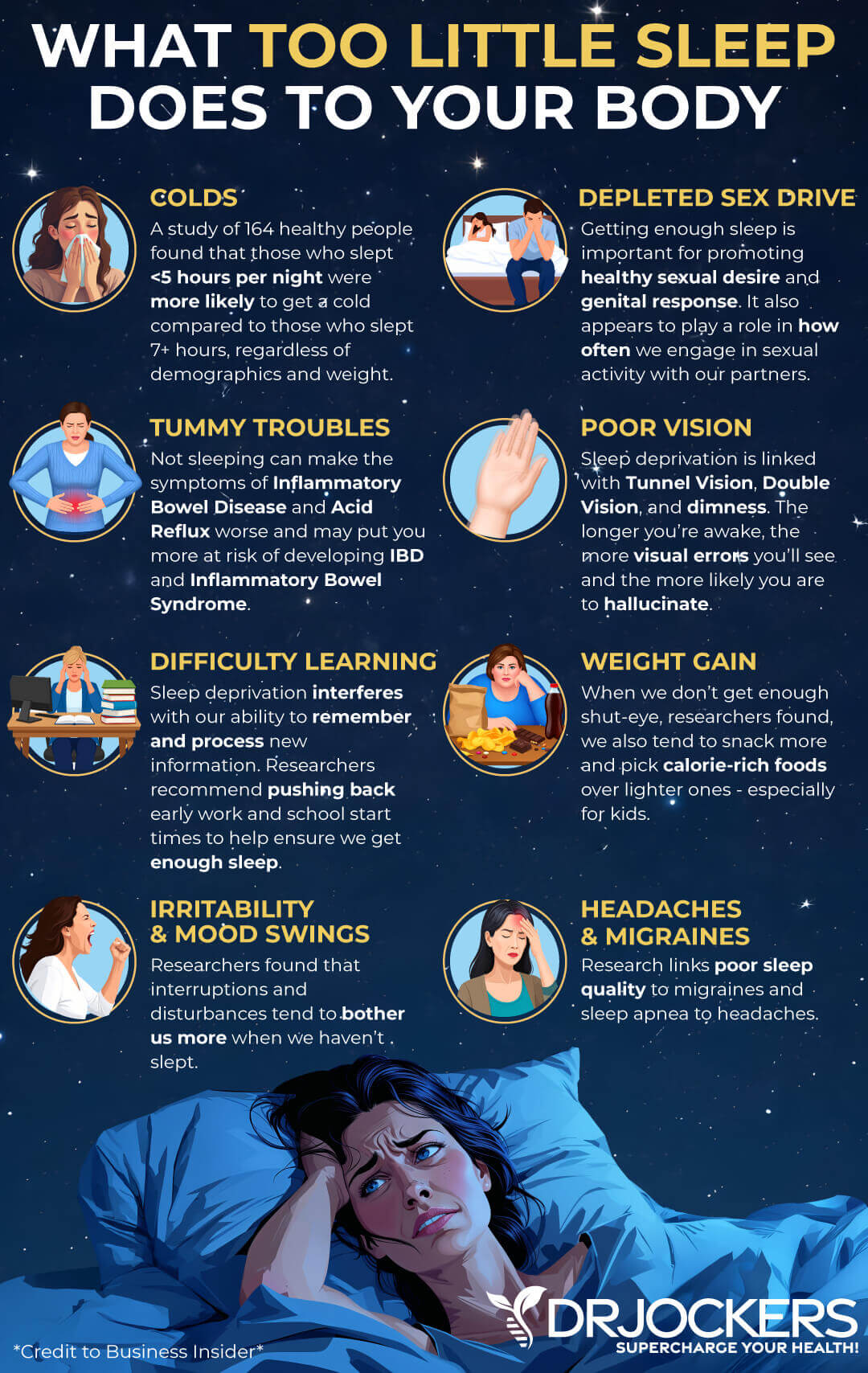
The Importance of Sleep
Good sleep is important for activating the glymphatic system of the brain. The glial cells are specialized immune cells within the brain and they help to function to clean up metabolic debris and flush it out of the brain through the cerebrospinal pump. Sleep is when this process takes place.
When we sleep we get rid of dysfunctional brain and nervous system cells and rebuild new neuronal connections. Additionally, sleep allows us to reset the balance of neurotransmitters and improve the sensitivity of the neurotransmitter receptors.
This is really important as many people suffer from conditions such as depression, anxiety, brain fog, and poor memory that are related to reduced glymphatic activity due to poor sleep quality.
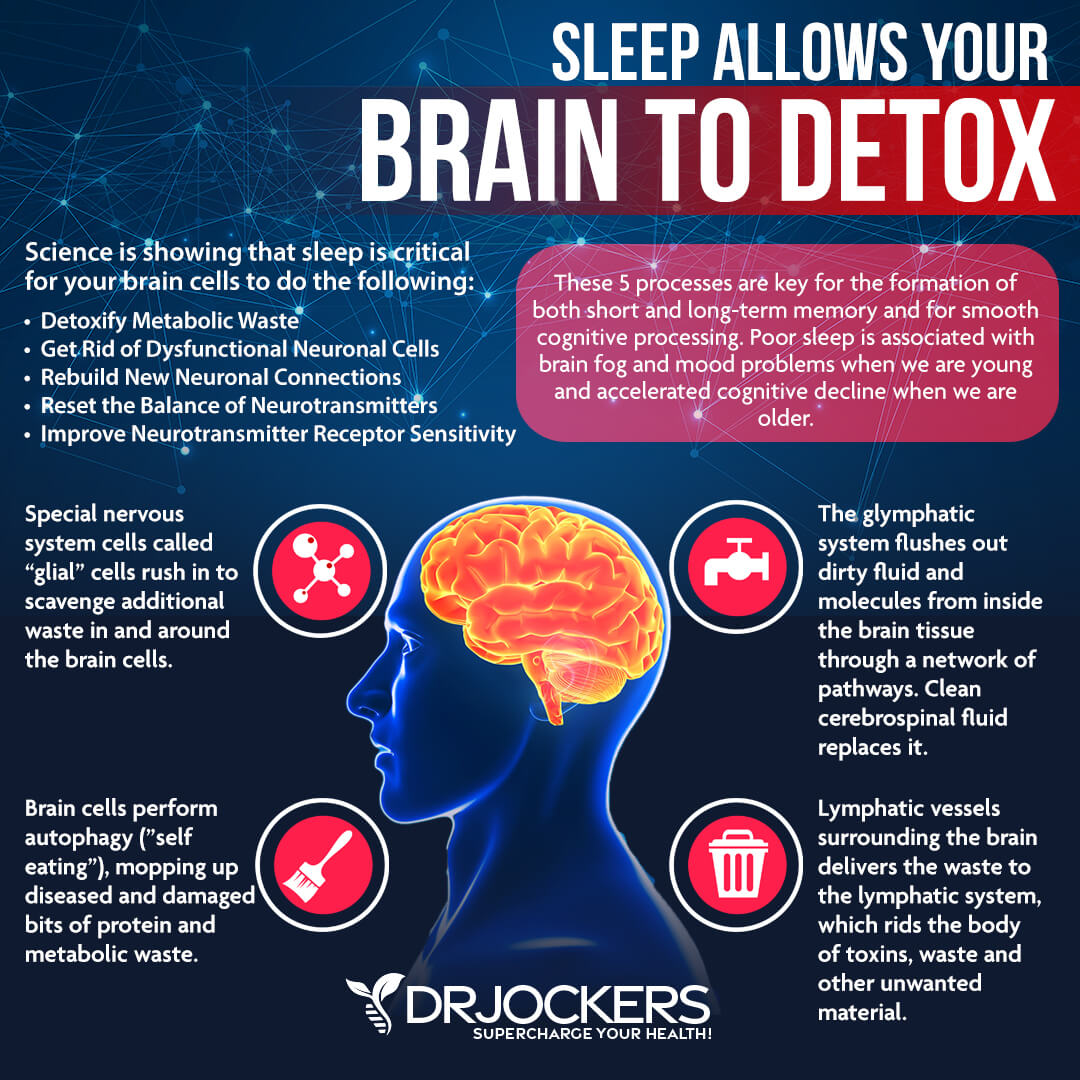
Nutrition-Related Sleep Problems
One of the reasons I think that the nutrition-sleep connection is not made is that the connections aren’t very obvious. These are what I have noticed to be some of the common culprits in my experience.
Blood sugar issues are so common in our society, that many people also suffer from nutrient deficiencies and disorders in their microbiome. All of these conditions can hamper sleep quality.
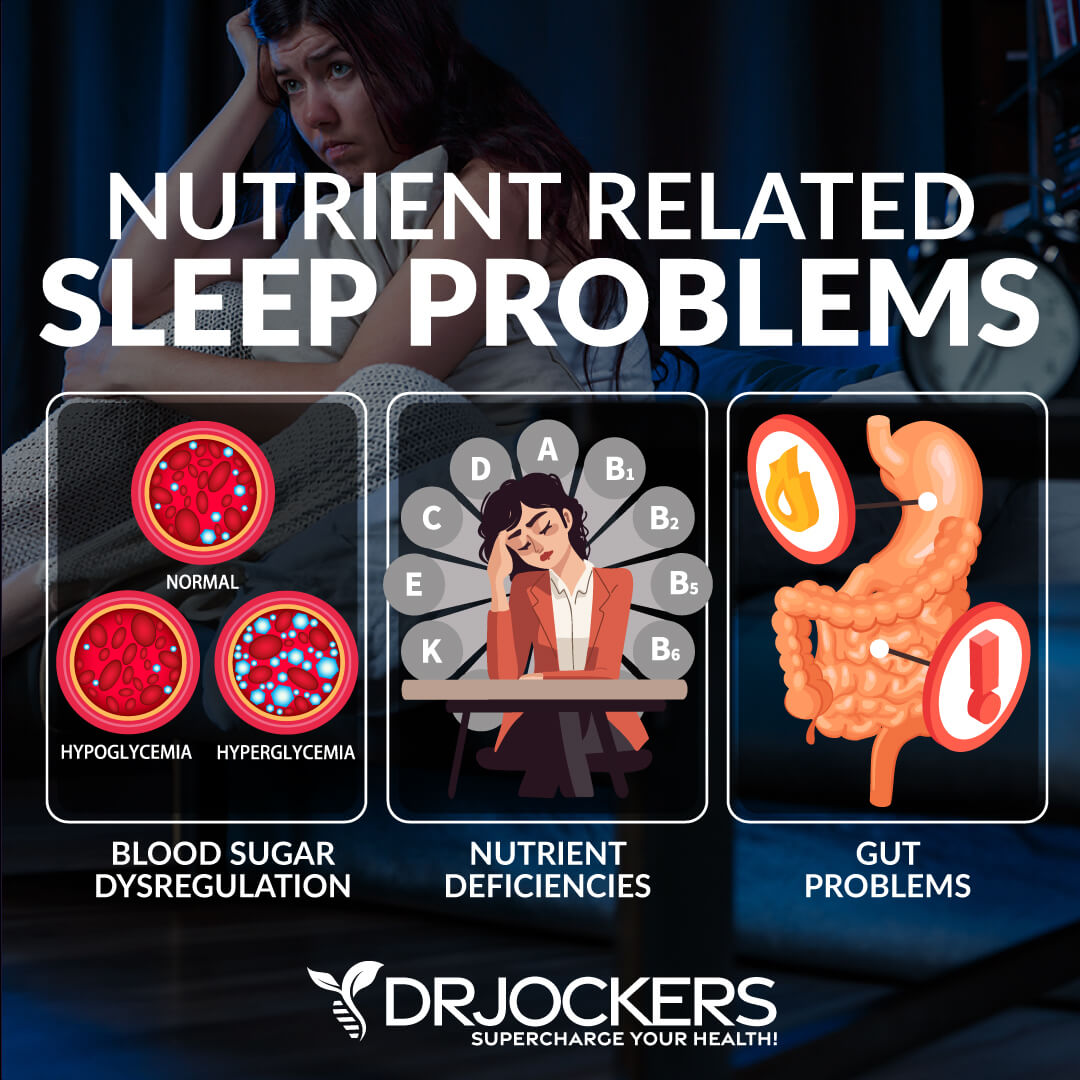
Blood Sugar Dysregulation
Blood sugar problems can disrupt sleep big time. The main reason this happens has to do with the hormone cortisol. Cortisol is a hormone released by the adrenal glands during high-stress situations or when the body perceives an immediate crisis. One of the primary actions of cortisol is to pull sugar from glycogen stores and into the blood so the body can use it for immediate energy to solve the crisis.
If we are eating a diet that is constantly throwing our blood sugar around, it can become hard for the body to regulate it. When an intense blood sugar crash occurs, cortisol is released to help stabilize it.
Consuming a meal rich in fast-digesting sources of sugars before bed will likely lead to this kind of blood sugar response and either prevent you from falling asleep or wake you up in the middle of the night. If you are someone who consumes a carbohydrate-rich diet and often wakes during the night, you may want to address this first.
Try instead opting for a meal high in healthy fats, a nice clean source of protein, and some slow digesting carbs. Scroll down for some great information on eating this style of diet.
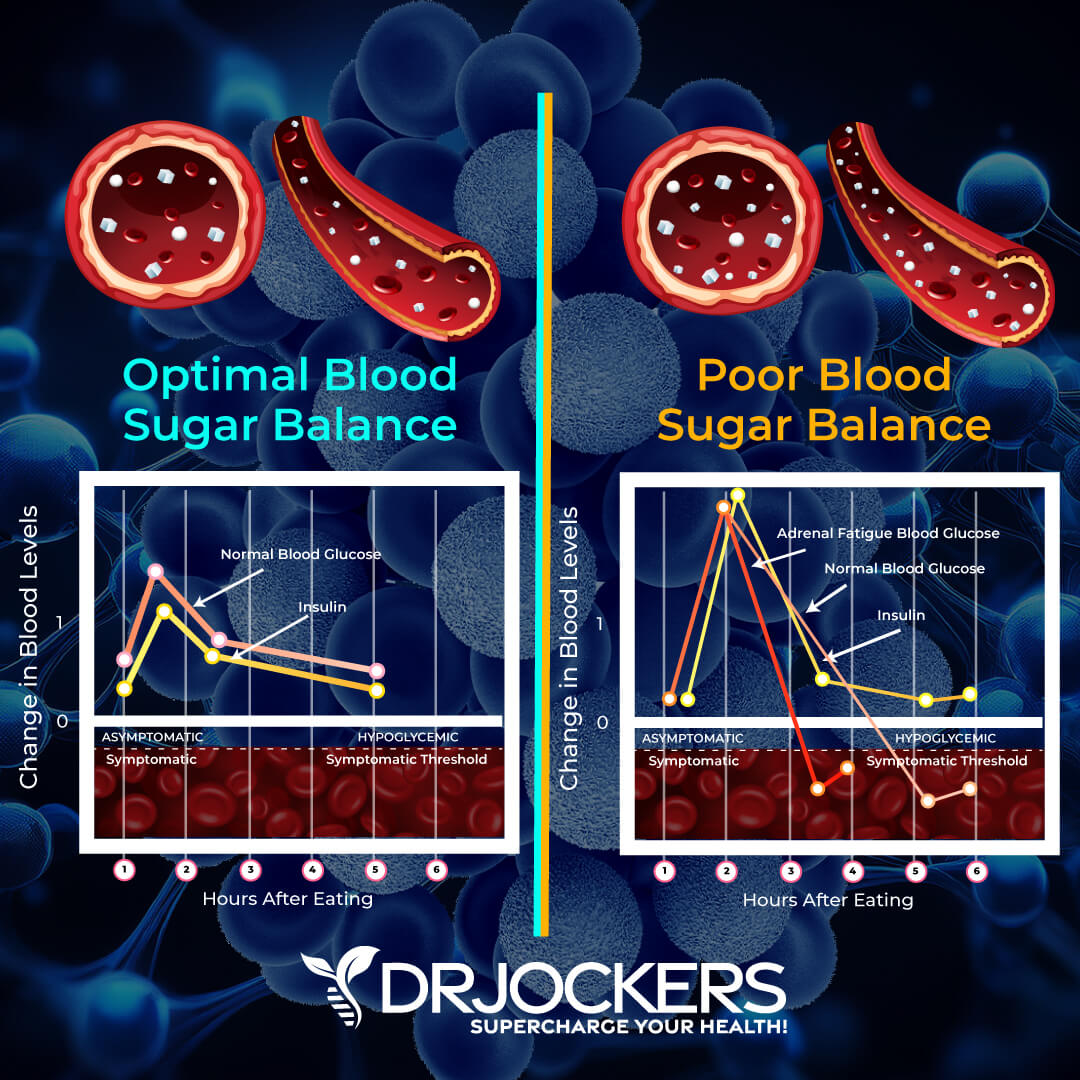
Nutrient Deficiencies
The body relies on chemical signals to properly regulate itself. Whether it is a hormone, neurotransmitter, or protein, the body needs to have the building blocks necessary to manufacture those chemicals.
For example, the inhibitory neurotransmitter GABA that signals the brain to relax requires adequate amounts of zinc, vitamin B6, magnesium, taurine, and glutamine. Being able to produce enough melatonin at night also depends on your intake of tryptophan which then needs all the necessary conversion factors to be made into melatonin.
I would say the two biggest factors here to address are to make sure you are consuming a super nutrient dense diet devoid of as many toxins (pesticides, molds, heavy metals) as possible. On top of that, you want to make sure you have strong stomach acid and a healthy gut, otherwise you will not be able to absorb these critical nutrients.
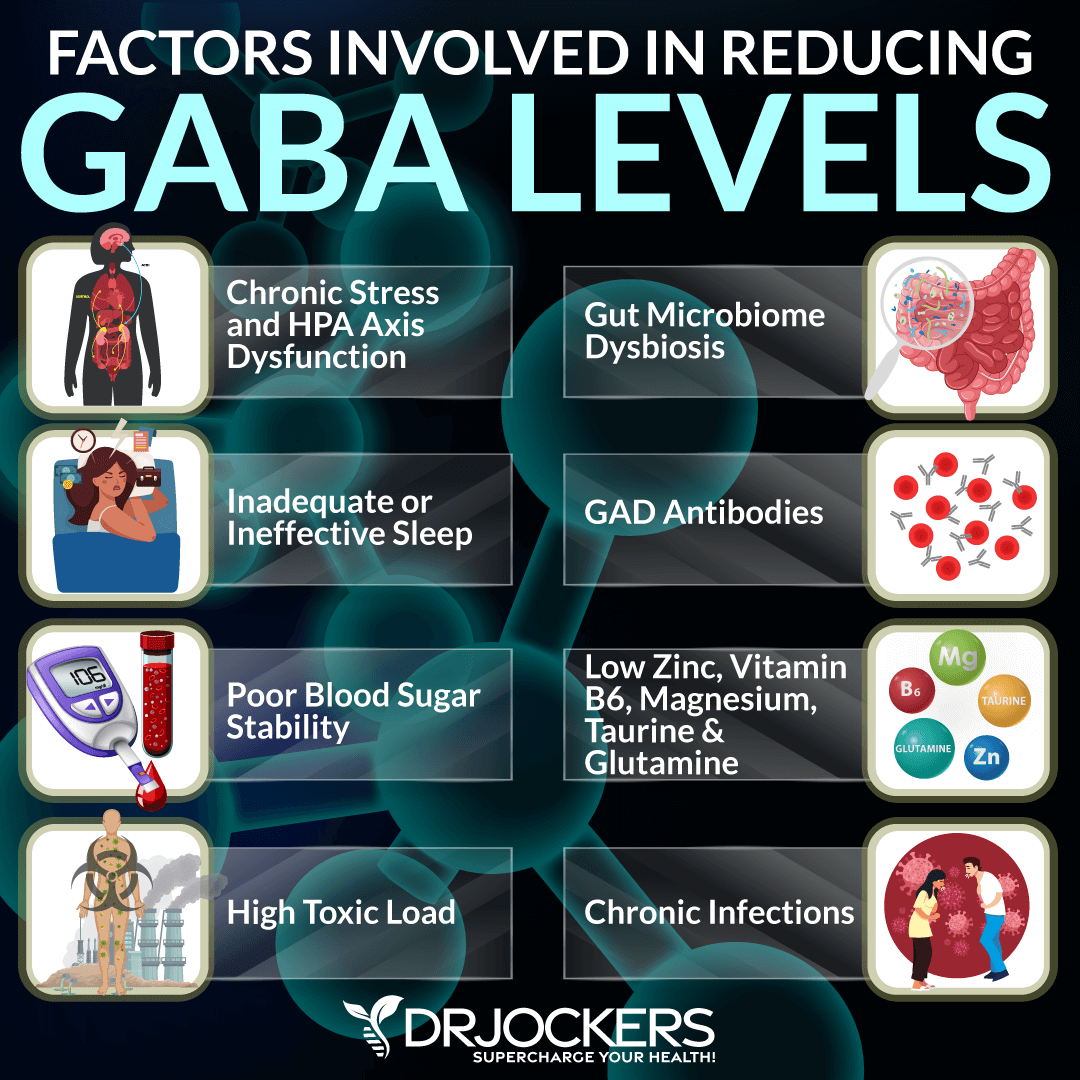
Gut Problems
Partially mentioned already, your gut health can influence your ability to get good sleep at night. Not only will poor gut health inhibit the absorption of nutrients needed to make sleep chemicals in the body, but can also damage the very tissues in the gut that produce these chemicals.
Did you know that your gut produces most of your melatonin (not your pineal gland)(1)? Gut health is tied to overall health in complex ways that we do not fully understand yet. I always look to the gut in times of dysfunction in the body, including chronic insomnia.
My main action tips here are:
- Remove as many toxins from the diet as possible that could contribute to gut damage. This includes pesticides, heavy metals, mold, and fungus.
- Be proactive in healing your gut lining. Consume things like bone broth, fermented foods, and a high-quality probiotic regularly.
- Find out if you have any food sensitivities. It is possible that foods you are eating every day are damaging your gut even though you don’t feel any different after eating them. Common ones are eggs, dairy, nightshade vegetables, grains, and caffeine.
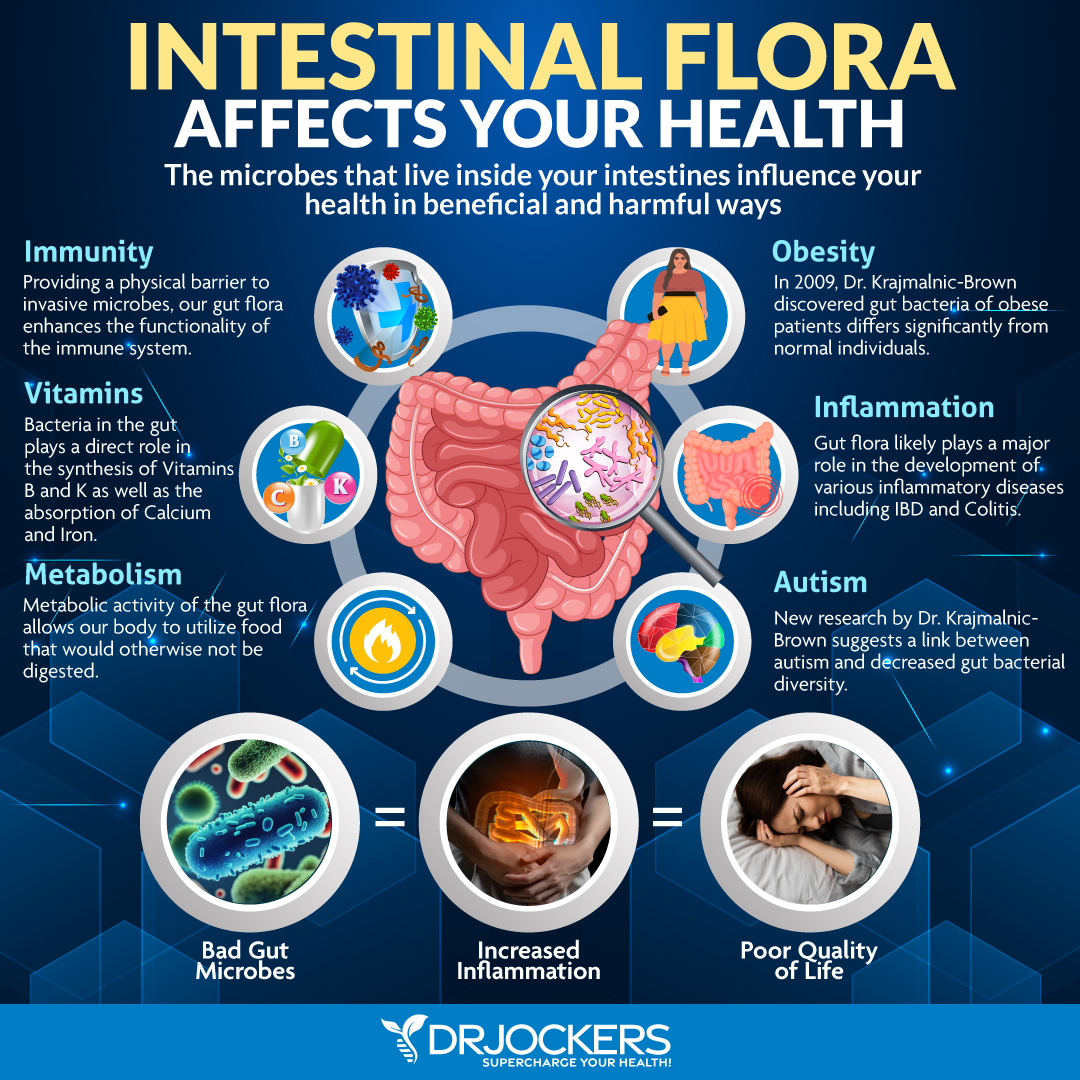
Healing Diet
The three major issues that were just outlined can be addressed nutritionally by following the healing diet guidelines here. This type of nutrition plan maximizes the nutrients you are getting from your food while also limiting toxins and sensitive foods that may be causing you trouble.
By following this style of eating you empower your own body to balance blood sugar, obtain the nutrients it needs, and give the gut a chance to heal any damage it may have. In addition to following a healing diet, certain supplements can help boost the quality of your sleep: some for daily use and some only recommended for occasional use.
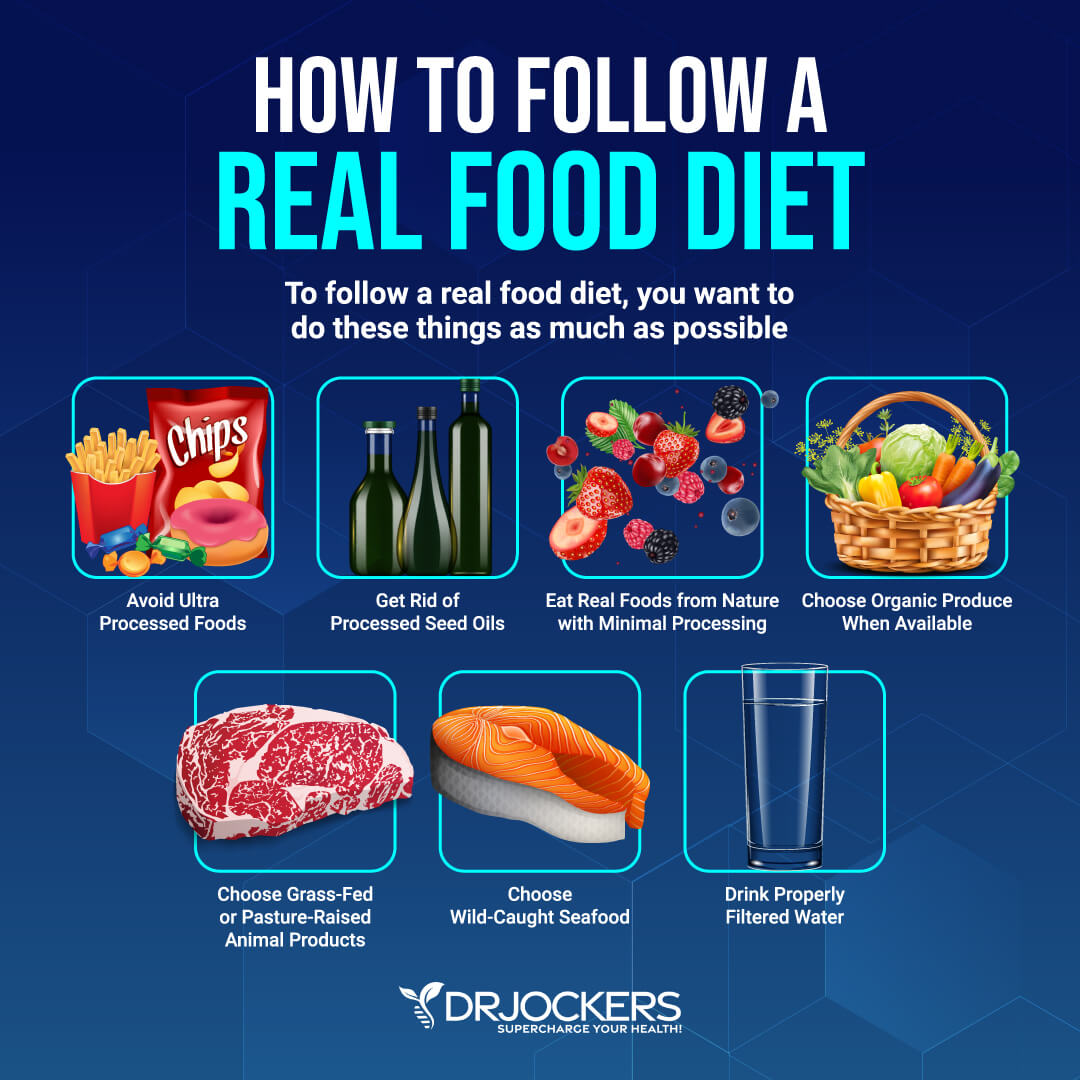
Good Sleep Hygiene
While this article is about nutrition and supplement strategies for good sleep, I can not overemphasize the importance of good sleep hygiene. Sleep hygiene refers to the practices you have throughout the day, especially in the evening that prepare you for a good night’s sleep.
This includes things like having your room cool and as dark as possible, wearing a sleep mask, and avoiding bright lights in the evening. The following strategies are things you can start implementing right away to ensure you are getting the sleep you need to be on your game all the time.

Top 4 Supplements to Improve Sleep
Although I wouldn’t consider a reliance on supplements for sleep a healthy practice, there are some supplements that can improve the body’s ability to induce sleep. When it comes down to it, sleep is a regulatory cycle in the body.
By using substances that improve the body’s ability to regulate itself, sleep can actually be improved over time and not just when the substance is being used. With that said, here are the best supplements to improve sleep quality.
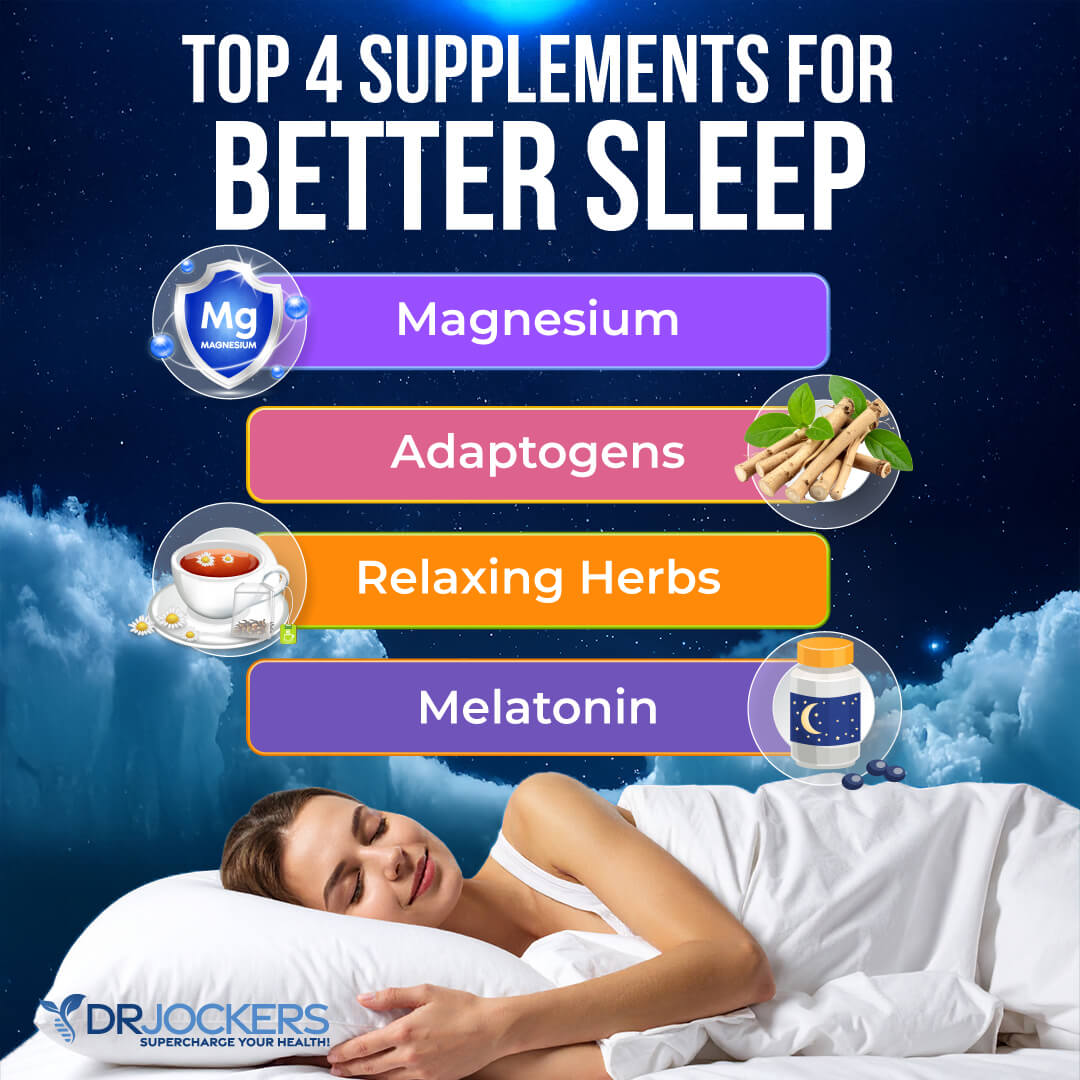
1. Magnesium To Improve Sleep Quality
I believe magnesium deficiency may be one of the most pervasive and insidious deficiencies of our time. There are many consequences of not taking adequate dietary magnesium. Utilized in over 300 different body processes, it just may be one of the most important minerals in our bodies.
In terms of sleep, magnesium plays a critical role in regulating melatonin and GABA levels in the brain (2, 3). Melatonin and GABA are released in healthy individuals to help induce relaxation and sleep. Without adequate magnesium intake, the brain may not be able to properly signal the body for sleep.
Also, for its ability to support GABA production in the brain, magnesium is an effective anxiolytic. Additional research has shown that magnesium helps to balance blood sugar, lower blood pressure, and relieve physical tension. For anyone experiencing insomnia, especially those who can’t seem to shut their brain off at night, magnesium is my go-to.
I typically recommend Brain Calm Magnesium or Sleep Deep clinically because these products contain a form of magnesium that has been proven to improve sleep quality and the Mag Sleep also has sleep-enhancing herbs such as lavender and tart cherry powder. I hear consistent testimonies from our followers about how well these two magnesium products improve sleep quality.
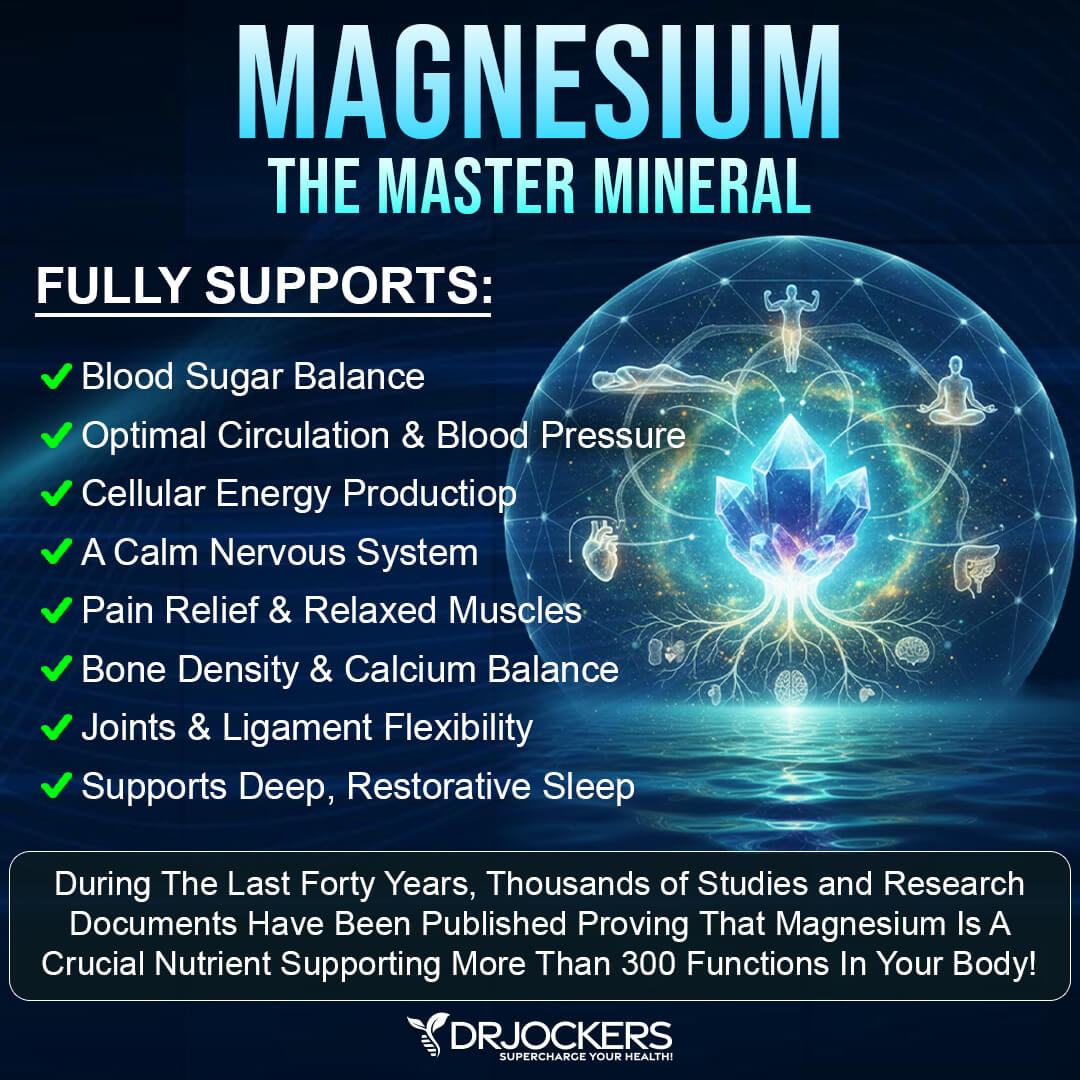
2. Adaptogens To Improve Sleep Quality
Adaptogens are substances that improve the body’s ability to endure stress. Traditionally, adaptogens were seen more as a performance enhancer for athletes but could they also improve sleep?
There aren’t too many studies investigating the direct impact of adaptogens on sleep. What there is, however, is research showing the ability of adaptogenic herbs to lower cortisol and improve anxiety. This could be an effective remedy for anyone who is enduring chronic stress or blood sugar imbalance that is causing an evening spike in cortisol.
The most effective herbs I have found for this purpose are ashwagandha, reishi mushroom, Magnolia bark, cordyceps, and Rhodiola (4, 5). One product we use is Cortisol Defense which has clinical doses of ashwagandha and Magnolia bark. These will help improve sleep quality and daily energy levels.
 3. Relaxing Herbs To Improve Sleep Quality
3. Relaxing Herbs To Improve Sleep Quality
There are several herbs that can help to improve sleep quality. I find that for someone with severe insomnia, these herbs don’t quite do the job. In combination with other strategies, however, certain herbs can complement a sleep plan very well.
Some of my favorite herbs to improve sleep are kava, chamomile, valerian, passionflower, lavender, and lemon balm. Instead of going out and buying all of these herbs, I usually recommend this Nighty Night tea made by Traditional Medicinals that combines many of the best sleep herbs in one tea bag. Use this daily to improve sleep quality! We also offer a great supplement with clinical doses of these calming herbs called Relax Calm.
4. Melatonin To Improve Sleep Quality
This one is touchy and there are many opinions on melatonin. When it comes down to it, melatonin is a hormone. The ideal situation would be to optimize your body’s own ability to create melatonin so I would consider this supplement an acute support for occasional use.
Supplementing with melatonin can be very useful for either occasional sleep support or retraining the sleep cycle. For this purpose, I really like this magnesium plus melatonin that can be applied to the skin. Applied to the abdomen this combination works really well for relaxation and sleep.
If you prefer Melatonin capsules we offer our Sleep Support supplement which is a slow release form that brings up your melatonin levels and keeps them sustained for the first 6 hours of sleep before they start to fade in order to prepare you to wake up with energy.
Bonus Sleep HACK: Camping
It’s starting to become apparent that many of our sleep problems are a result of not being fully in tune with nature. Naturally, our bodies should coordinate with the cycles of night and day and additional support shouldn’t be needed. While nutrition plays a huge role in helping the body regulate itself, there is another major deficiency that I believe affects almost all Americans. This deficiency is exposure to nature.
The benefits of being in nature are increasingly being uncovered and range from mood improvement, boosts in creativity, better immunity, stress reduction, and yes, even better sleep. A recent study investigated the influence that camping has on our sleep and found that in the absence of artificial lighting (that means no cellphones), sleep onset occurred much earlier and in sync with the rising and setting of the sun (6).
The most valuable hours for sleep are considered to be between 10 PM and 2 AM so using camping as a way to reset your sleep cycles could be a game-changer. The study found that even just a weekend of camping had a powerful ability to reset the circadian rhythm. Additionally, being in nature during the day will lower cortisol, improve mood, and inspire creativity!
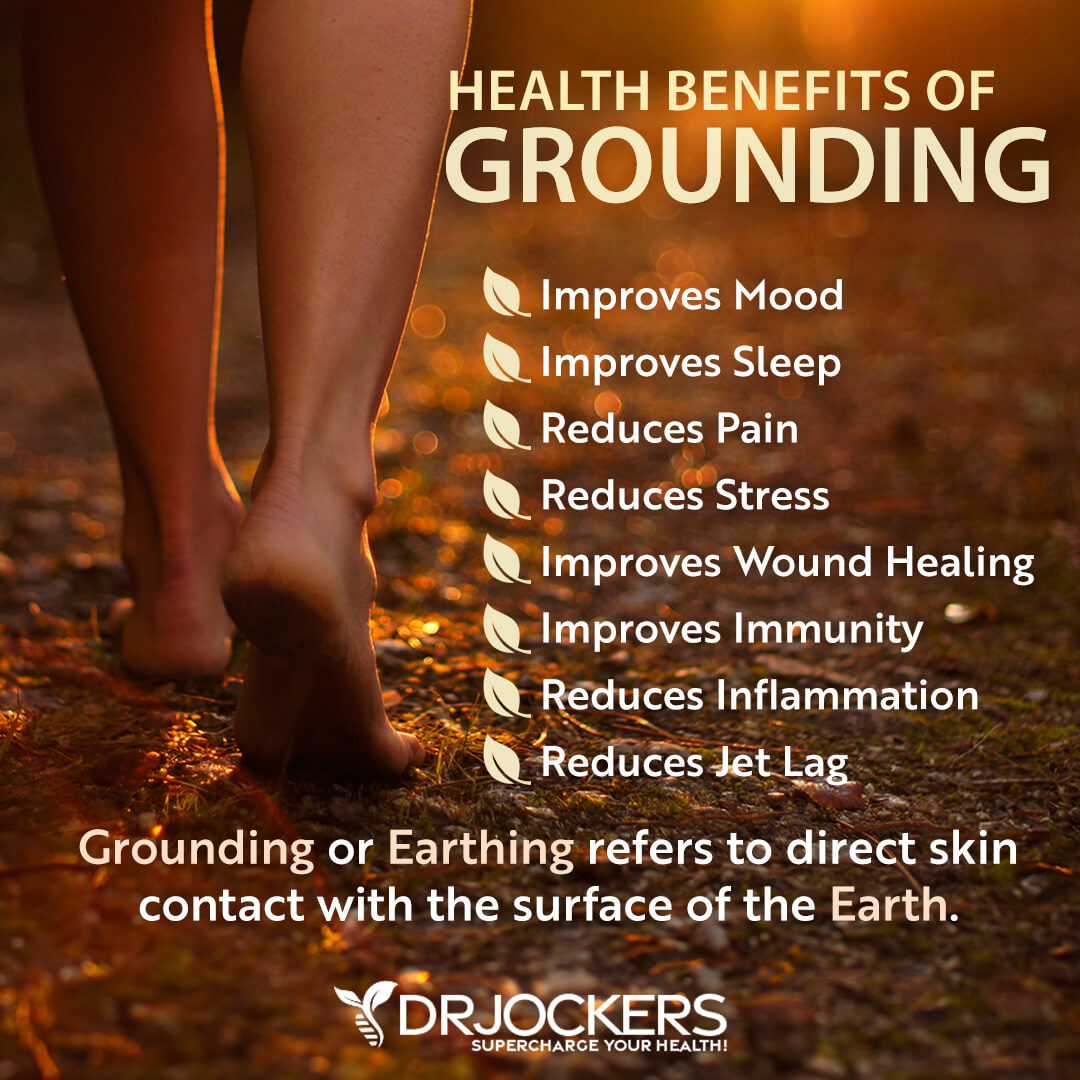
If you want to work with a functional health coach, I recommend this article with tips on how to find a great coach. On our website, we offer long-distance functional health coaching programs. For further support with your health goals, just reach out and our fantastic coaches are here to support your journey.

Inflammation Crushing Ebundle
The Inflammation Crushing Ebundle is designed to help you improve your brain, liver, immune system and discover the healing strategies, foods and recipes to burn fat, reduce inflammation and Thrive in Life!
As a doctor of natural medicine, I have spent the past 20 years studying the best healing strategies and worked with hundreds of coaching clients, helping them overcome chronic health conditions and optimize their overall health.
In our Inflammation Crushing Ebundle, I have put together my very best strategies to reduce inflammation and optimize your healing potential. Take a look at what you will get inside these valuable guides below!
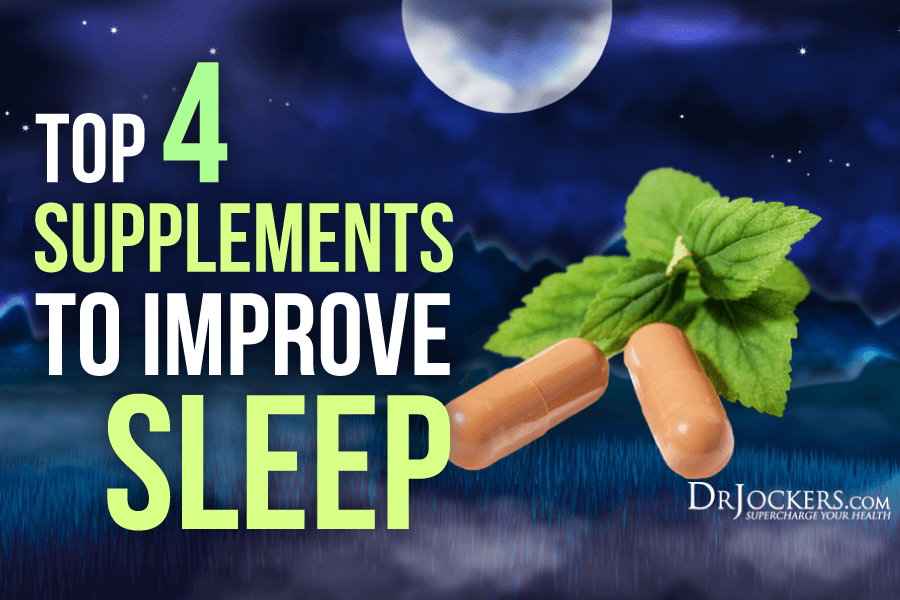
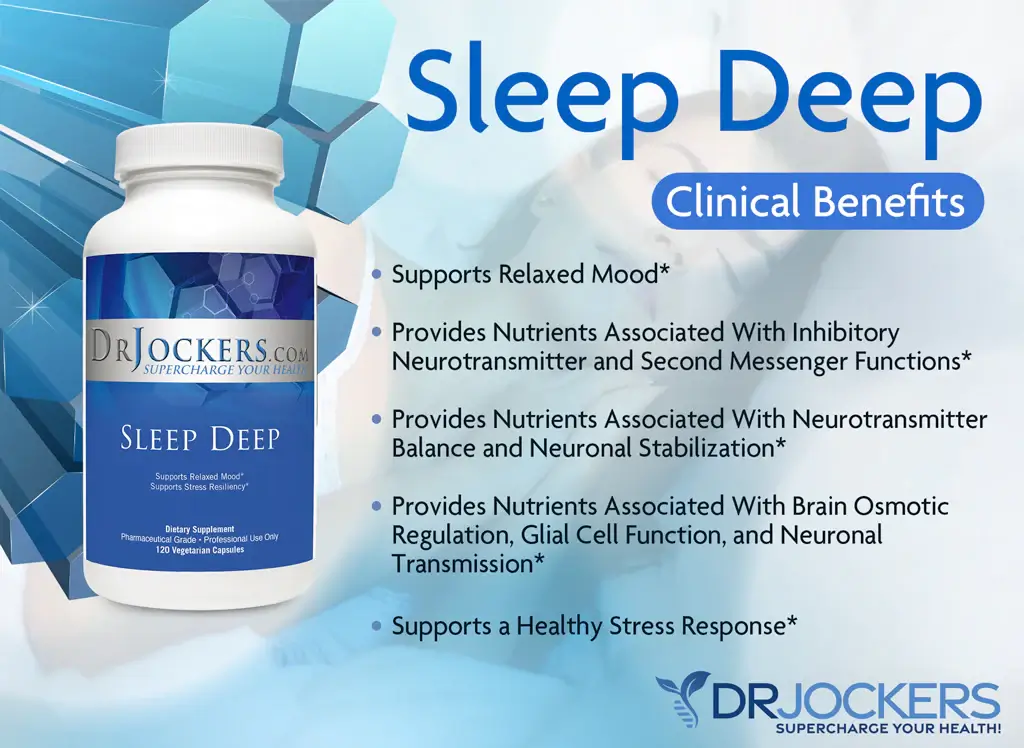
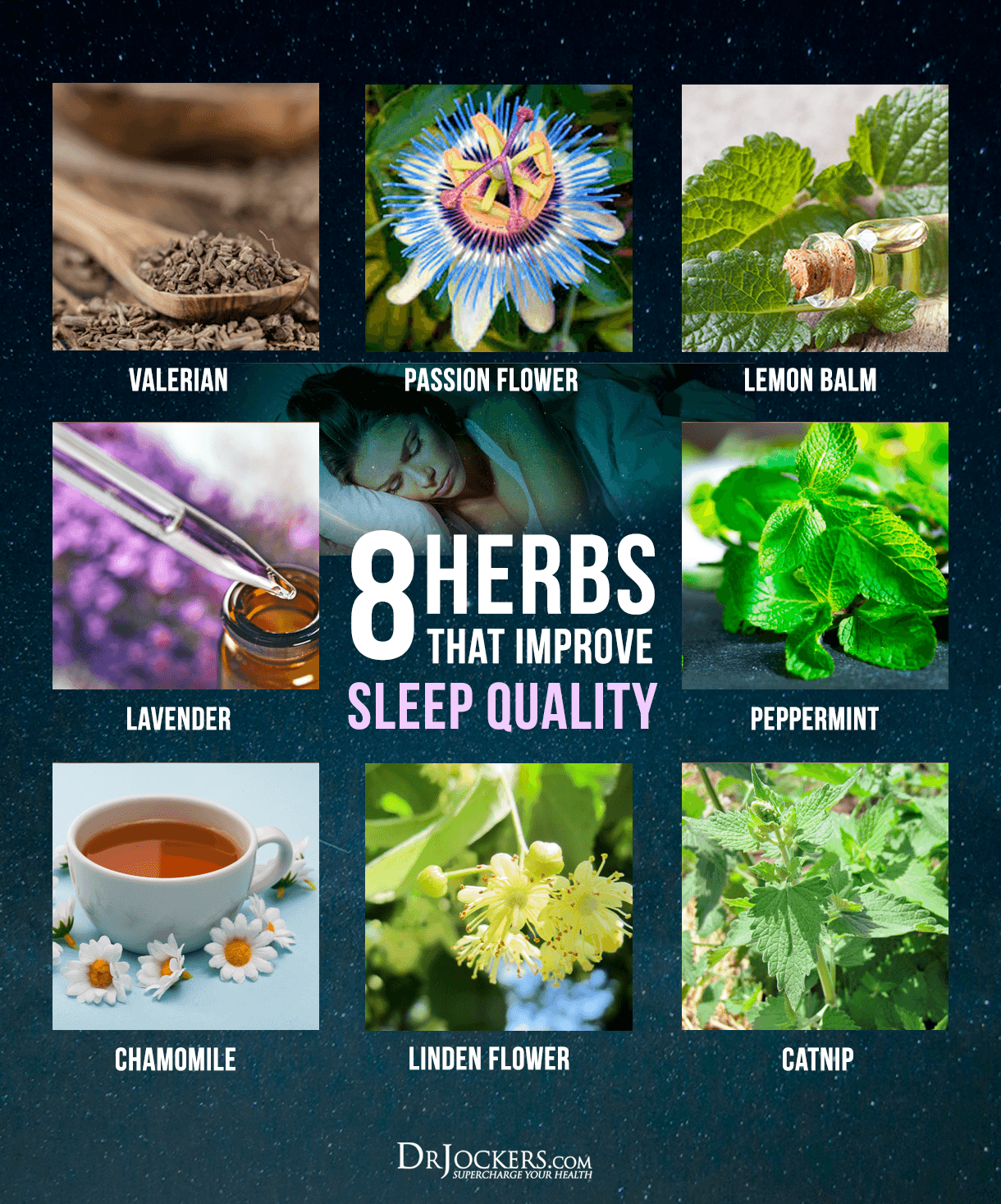
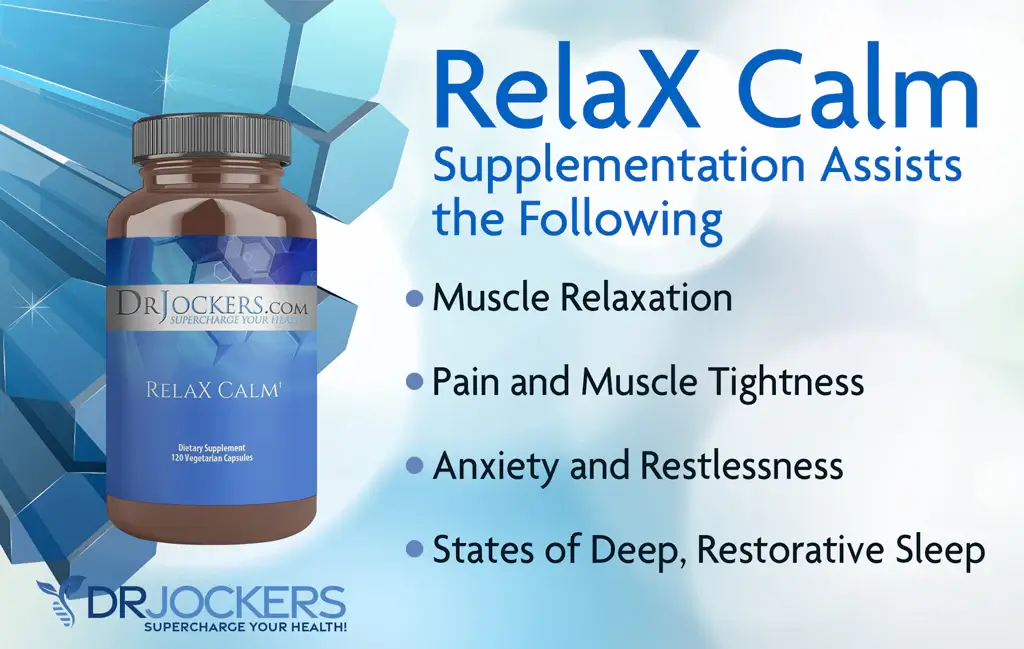
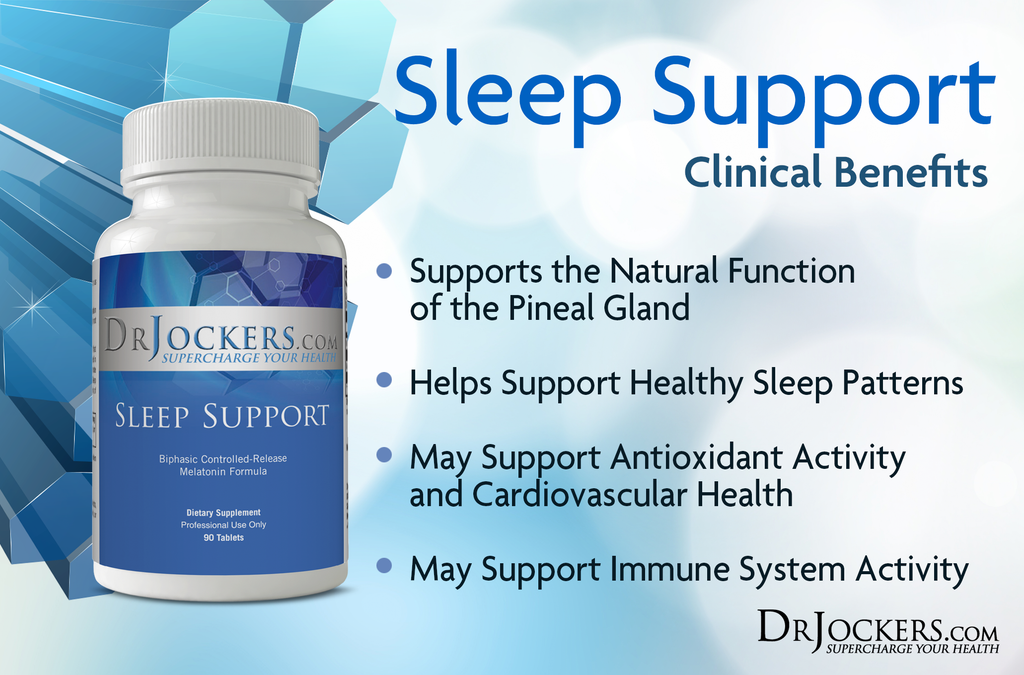





Thank you for sharing all these ‘gems’ with us Very interesting articles.
Thank you
Thank you Yota!
I had also seen a clip about parasites waking people up in the middle of the night, so that is something to get checked. Have you heard of that?
Also on another site I had seen that taking a small dose of 20 Mule Team Borax diluted in water, see earthclinic.com for more information, will help with sleep…
Yes Rey that is a common side effect of infection!
How much?
Thanks for another great article. What form of Magnisium do you recommend? I use : ascorbate, stearate, oxide & oxide monohydrate.
Thanks for reading Hana! I like malate, threonate, and chloride for different reasons. I have a whole article on it here! https://drjockers.com/best-magnesium-supplement/
Thanks for your answer. It’s a great article about magnesium.
What is your supplement made of, for I need to know it’s kosher.
Which product are you referring too Hana?
BRAIN CALM MAGNEZIUM.
On general. do your supplements have any supervision about KASHRUTH?
This particular product does not use any animal products
Thank you very much.
You got it!
Thank you, Dr. Jokers. Some things I knew-about the role of magnesium, for instance, but I was surprised to find out some other new information. All these supplements you mention can be used at the same time with classical medication for anxiety and part of depressions-anxiety prevails-like Effector and some pills for sleep? I used to take just Effector for about six years,and I felt great, but my mistake was that I gave up pills gradually and two months it was all right until all of a sudden the symptoms reappeared. Now I am taking Effector of 150, just like before when I felt great, but now I have to help myself with some pills for sleep and calmness until Effector begins to really work. Thank you again for your precious advice! Congrats for your great family!
Glad to hear you got a lot out of this Daniela! Be Blessed!
Thank you for this very rare, thorough & informative information regarding to causes for sleep deficiency!
I would like to try the Brain Calm Magnesium (hopefully to help w/ my nightly blood sugar issues). As long as it doesn’t containl-theanine I should be alright. For some reason I was sensitive to that when trying it a while back. I do have sensitivities to some supplements (not just foods or medications). Could be due to a pituitary adenoma??
Anyhow – thank you for such valuable information Dr. Jockers!
Best regards,
Isabel A.
Hey Isabel, yes the Brain Calm Magnesium does not contain L-theanine. Blessings to you!
Months later – I’m finally viewing this! All my sincere thanks & blessings to you & your family. 🙂
You are very welcome! Blessings!
Hi Doc! I’ve never used malate before. I was told it is hard to absorb. I have healed my gut which promotes deeper sleep.
I use Natural calm, Nitey Nite tea, liquid melatonin, um…not altogether…lol.
I’m Interested in using your premethalated b.
I have both gene MTHFR.
I was using Uckele brand Bio V. And taking Dr. Groups B12 2500 mcg liquid, 1/2 dose.
Will I have to take extra B12 with your formula?
Appreciate your input.
Tyvm.
Nancy.
Hello, if you are taking a premethylated B vitamin, you would not want to take extra B12.
I really need help with the middle of the night wake-up problem. It seems like I am often awake for an hour and then I can go back to sleep. I’m currently taking melatonin, magnesium and vitamin C before bed.
Sorry to hear this! I would try some good wind down strategies discussed in this article: https://drjockers.com/deep-sleep/
Do you ship to Canada?
We have been having problems of recent with getting our products to our Canadian customers. Please follow up each month with sales@drjockers.com and our team will give you the most current update on this. Blessings!
Would you be able to tell me if your herbs for sleep are low in Oxalate? This has cause me a lot of trouble sleeping and I have had to stop some Herbs!
Yes they are low oxalate.
These days I get up about three times a night to pee.
Yet I have no kidney , prostate, heart or any digestive problems
and I usually go back to sleep immediately.
Hello Ian, I would reduce liquids in the evening!
We live in the country which is great for fresh air and lots of room to walk in nature but I am still concerned about walking around barefoot bcuz we also have deer raccoon possum coyote chickens wild turkey dogs and even a bobcat ! Running around here and I am concerned with parasites/worms etc Not to mention thorns twigs sharp rocks …. Is there some kind of sock or foot covering that the fabric used still allows for the grounding process to happen?
Yes fabric is ok but rubber soles do block the electrons from transferring to our bodies so we have to take off our shoes.
Love linden flower tea!
Every year I collect enough flowers to last me all year. I’ve been taking your brain calm mag for a while now and LOVE it. I do think it recently got smaller though…?
Started taking melatonin after menopause as well. I think I finally got my sleep down now. 🙂 Unless of course I cheat with the sweets, then I pay for it. Haha
Glad to hear you are doing better Margaret! Blessings!
Insomnia’s awful. Tried supplements including adaptogens since 2007. Then even Rx sleep meds didn’t work. They were my last resort. Melatonin made me nauseous. That’s finally changed. I increased some dosages and combinations. Now take 200mg Magnesium during the day, another 300-400mg one hr before bed, along with 1x L-Tryptophan and/or a 1/2-1 dropper of Passionflower liquid extract. This works. And magnesium increase was they key. But you must increase gradually (I learned the hard way). Taking up to 800mg of magnesium, which was recommended to me, was horrible. As they forgot to say to do so gradually! Starting with 200mg both AM & PM, then adding 100mg in the PM every 4-7 days. That was the magic. Many ppl need a much more Magnesium than they think, I was one of them. One dr told said, up to 800mg maybe what you need (but gradually). I’m now taking 500-600mg. And the type of magnesium is important. Forget oxide, it’s basically a laxative and cheap filler. Magnesium Glycinate or Bisblycinate (same thing, two different names), or Threonate is great. They cross the blood brain barrier for greater benefits.
I seldom have trouble with sleep, since I follow most of your recommendations.
However, i have had some bad occasions when I tried melatonin 3 mg x 3 tablets
but they did not help at all.
Hello Ian, yes for a small subset of individuals, they do have trouble with melatonin supplementation. If you have had these issues, try the 5-HTP and L-theanine in our Mood Protect product or the calming herbs.
Your health emails are amazing. They are researched, seasonally repeated, and so well explained and illustrated. I have bought some products through your site and hope to purchase more as income is available on retirement income. I wanted to thank and bless you for all you give…and give…and give.
Have you heard of ‘Valerian Root’ as a herb to help with sleep?
Hello Dr Jockers,
I have sustained TBI years ago along with other traumas. I definitely have difficulty with sleep issues! Also hypoglycemia & adrenal insufficiency. I take Valerian root & melatonin which help some. I’m wondering if the sleep troubles are due to HPA dysfunction? I waken after 12:30 am & sometimes go back to sleep around time to get up. I plan to check out your products asap. Any other suggestions are welcome.
I had this problem. Turned out my nighttime cortisol levels were really high. I use a product called Seriphos which lowers cortisol by fixing your HPA axis. It has a long history. I take one before dinner and 3 before bed. I also use lactium in a product from Swanson that works faster and I take one with a Seriphos if I wake at night and have trouble going back to sleep.
Great advice. Look up Jim Donovan TedTalk where he shows how you can used rhythym to slow your brain down and sleep (it also helps your vagus nerve). It really works but it took a few times for it to work for me. I used it this mornign when I woke at 6:30 and overslept to 10AM.
Thanks! I will try this.
Amazing Graphics!!!
I am an engineer, I only wish I could create such beautiful infographs.
Hi Tee-
I’ll share my opinion…Dr. Jockers, like some other alternative health people I listen to, has proven to me that he’s done a lot of research and gets specific about what’s going on and what works to alleviate the problem. I feel his articles prove that, but each person has to decide for themselves if they trust a particular expert or not. I don’t have a problem with the fact that he then goes into the supplement production field because he has concluded specific ingredients and formulas work best(and explains why), and they probably aren’t available in the market otherwise. I want to point out how much he’s sharing for free, no charge to educate yourself here…then it’s your choice if you want his products or go on to other ways to take care of yourself. One more point- where could we even find these supplements advertised? Not on Mainstream Media- all “brought to you by Pfizer”.
Best to you, Kathleen
Do you have any specific products that you recommend for “earthing” or “grounding”.
Yes we have some helpful information here: https://drjockers.com/grounding-optimal-health/
Thank you, Dr. Jockers, you mentioned in a recent podcast about an app or podcast you like to help sleep I think it’s called sleepy magic or something, do you have the link to that? Thanks.
Yes https://podcasts.apple.com/us/podcast/sleep-magic-guided-sleep-hypnosis-meditation/id1650407051
Bravo, Dr. Jockers!! 👏🏼👏🏼👏🏼 You have the such full-spectrum information and easy-to-assimilate graphics. I love your presentations.
I started experiencing severe sleep difficulties when my loved one was mandated to get a certain vaccine regardless of the fact that he had stayed ‘virus-free’, even working ‘the unit’.
He had a reaction, started getting uncharacteristically ill almost every month, and out-of-the-blue was diagnosed with Stage IV neuroendocrine cancer a year later when he had not been sick in over 20 years, except for the post-vaccine illnesses. His immune system had been altered and his body could not protect itself. I took care of him 24/7 until his passing.
My sleep took a hit in the process as I would wake up every hour on high alert, making sure he was OK (He would try to get up by himself in the middle of the night and fall, or need end stage pain, medicine, etc.)
My deleterious sleep issues continued even after he had moved on.
I tried almost everything you mentioned in your presentation above, but in the final analysis, my nervous system was stuck in sympathetic mode due to the extreme stress I experienced the previous year, regardless of somatic release techniques, counseling, breathwork, the things you mentioned, etc.
I finally found relief with bio-matched frequencies which helped me shift into parasympathetic mode. Ahhh . . . sweet, glorious sleep, at last! 😴
Thank you again for your incredible work. I shall return.💯
P.S. — BTW, my sweetheart really enjoyed your prolific info. After 30 years in critical care medicine, he realized that 75% of the patients in the ICU wouldn’t be there if they had learned how to take care of their minds and bodies. He returned to school and became a Holistic Health Practitioner with a specialty in Chinese medicine (2,000 hrs total).
He would tell hospital patients on the sly that they could wean off their prescriptions if they saw an acupuncturist, naturopathic practitioner, functional medicine doctor, chiropractor, etc. — depending upon their condition.😊
Thanks so much for sharing all of this!
I have to say You Dr Jocker always do great articles.
Thanks so much John!!
People should check out Dr.William Davis and his book Super Gut. I have been making his Lactibacillus Reuteri yogurt and it has been incredible. Anxiety way down, sleep much better and my skin problems cleared up. Its amazing.
Only problem with Magnesium supplements for me is it creates VERY loose stools! (B M’s)
For the past 6 years I have suffered from a rare disorder,BFS,Benign Fasciculation Syndrom..I have spent a huge amount of money but not one thing helped..there is no cure or treatment I know of..I don’t know if you have actual experience with this health issue but I am asking if you have had any success with this terrible disorder. My entire body twitches and the only thing that helps are ice packs…Can you help me regain a more normal life and be able to sleep more than a few hours a night usually interrupted by the twitching I have no control over..Thank you so much for any advice or remedy you can offer.